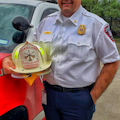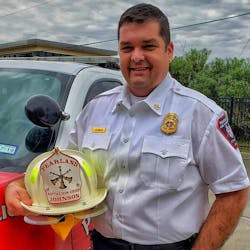First Due: Being a New Officer: More than Passing a Test
Mentoring. It has become the most underrated and forgotten skill on the job.
Far too often, and more than we like to admit, we associate mentoring just with the rookies who hit the firehouse. When it comes to rookie officers, we assume that all of the time that they spent studying for promotional exams, being a part of committees, taking on special projects, etc., prepared them for that first appointment. Although these things might prepare them for administration work, organizing their day and meeting deadlines, those three items are only 10 percent of their day-to-day job.
Embracing the anxiety
The first part of any successful mentoring program for new officers is a solid, consistent training program before those people hit the firehouse “by themselves.” This is the biggest opportunity for a senior officer/captain/chief to have a once-in-a-lifetime effect on new officers, the one that remains with them forever, the one that they refer back to when they make decisions, have bad days, have difficult conversations or even in moments of celebration throughout their officer career.
On the first morning of the mentoring program, the senior officer/captain/chief must sit down with new officers to establish expectations. What kind of expectations, you might ask? Easy: the expectation that for at least the next year—almost always longer—when the alarm clock rings, it always will feel like/similar to the first day that they were put in charge of their crew. Getting ready in the morning—brushing their teeth, putting on their uniform, kissing their family goodbye—will be different than before they were an officer. As they walk to their vehicle, they will have more pride, but more anxiety, too, because they know in that moment that their books, policies, assessment centers, test and interviews didn’t prepare them for this feeling. As the senior officer/captain/chief, you must explain that this is OK.
Share mistakes, lessons learned
Take your new officers through your first day. Be vulnerable and share a mistake that you made with the individual or a victory and what you learned from that.
Explain to new officers that they can be certain that some days will feel like a failure, but that’s only because they care so much, and that in those moments, there are milliseconds of success, and you will be there to walk them through and teach them.
It’s important for new officers to know that they will have questions. Put another way, they can’t expect of themselves to have all of the answers. However, they can bank on that fact that they will have you to help to guide them down the path of success.
‘I won’t let you fail’
“What if I fail?” they might ask. Good leaders will answer, “I won’t let you fail, and you won’t let yourself fail, because of the passion and the love that you have for our department and for the job,” much like my fire chief, J Taylor, told me in August 2022 when I accepted the appointment to assistant chief of the Pearland, TX, Fire Department and worried about potential failure.
Keep in mind that “I won’t let you fail” doesn’t mean that the new officer won’t do something wrong, miss a deadline or get an old-fashioned firehouse butt chewing. What it means is that, when the new officer does something incorrectly, misses a deadline, makes a sketchy call on scene or gets that butt chewing, you—the senior officer/captain/chief—will take full advantage to point out the shortcoming, resolve it with the new officer and provide the individual with the information that’s needed to not let it happen again and to be successful in the future. That’s what’s expected of us by our predecessors. That’s our job. That should be a new officer’s expectation of you.
This expectation talk isn’t one of official manner as their boss or senior officer. This expectation talk is the brotherhood, the sisterhood. It’s action, not a word or phrase. This is a senior officer’s moment to find the opportunity to have an effect. Don’t miss it. Walk new officers to the right front seat on their apparatus of the day. Let them have their moment of “I am a company officer.” Introduce them to their mentor for the day. Wish them luck and watch them grow.
You’re done now, right? It’s that easy, right? Nope, not even close. They haven’t even made a run yet. You just are getting started. Crawl low rookie, follow me.
About the Author

Jacob Johnson
Jacob Johnson started at the Katy, TX, Volunteer Fire Department as a Junior Explorer Post Firefighter at 15 years old. Throughout the years, he moved up in the ranks until he changed departments in 2007. Johnson was one of the original full-time members who was hired by the Pearland, TX, Fire Department, where he currently sits today as a member of administration, serving as an assistant chief. Johnson has taught at numerous schools in Texas and has traveled over the past year to teach his mentoring and leadership class.
